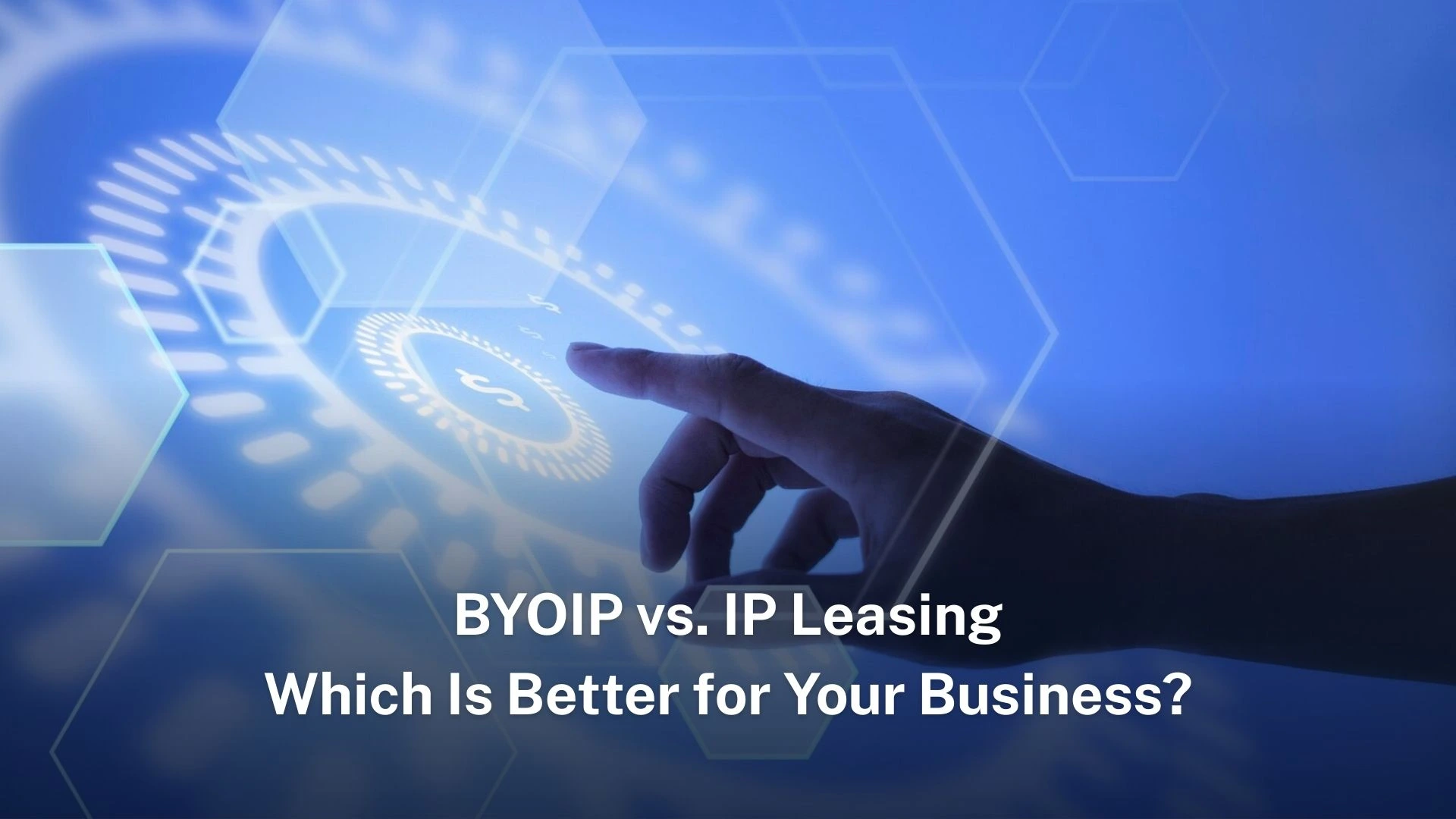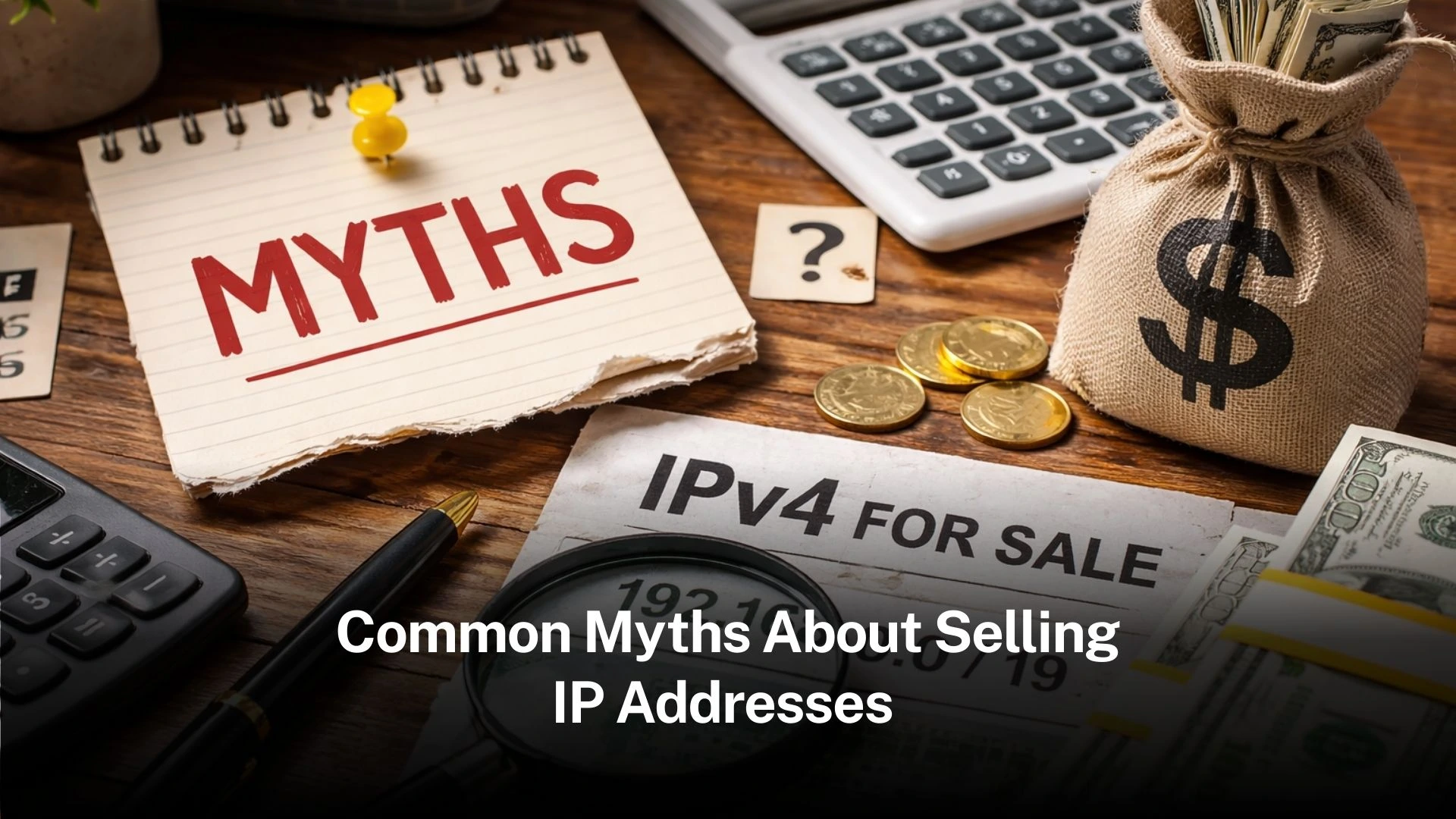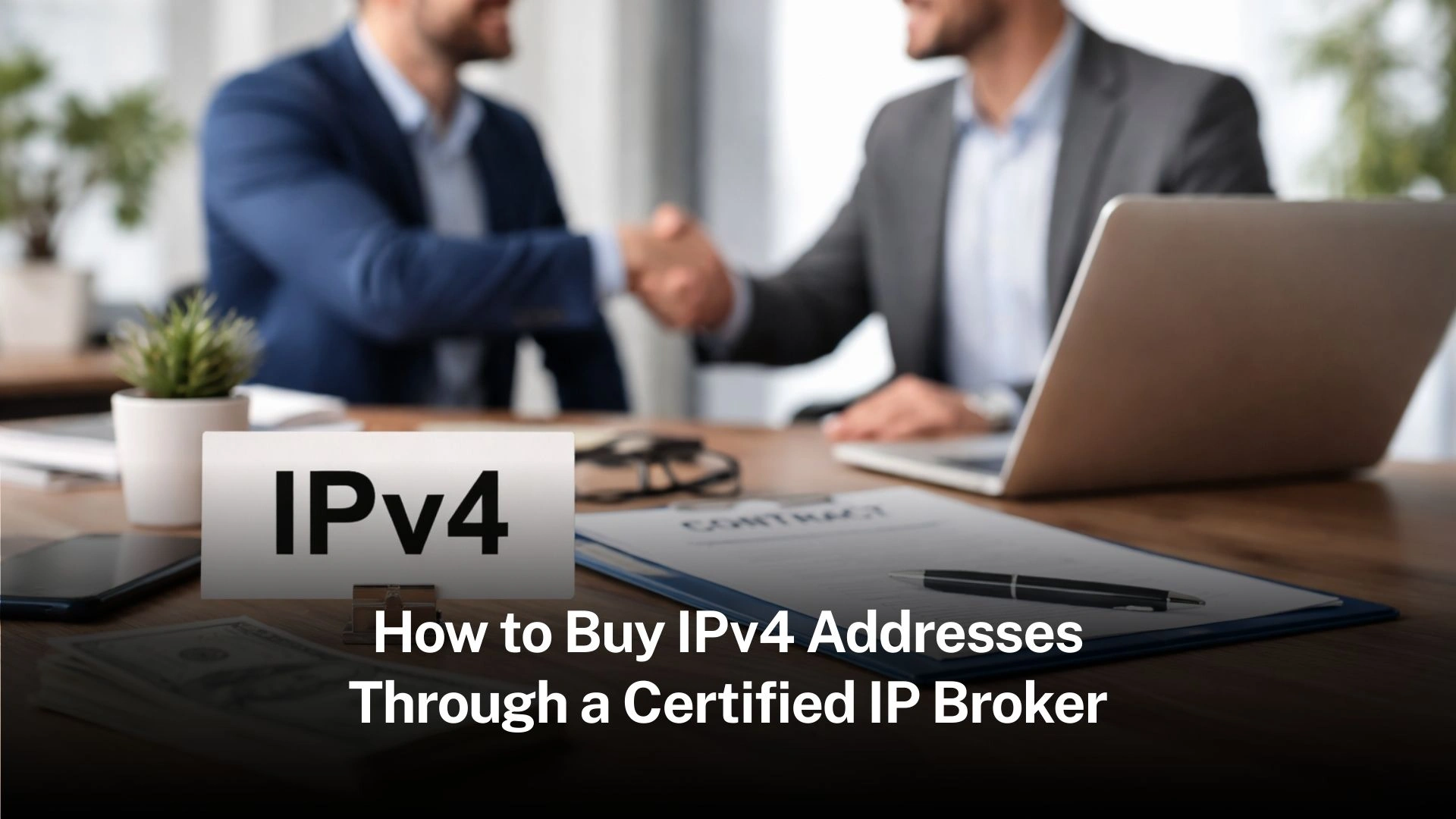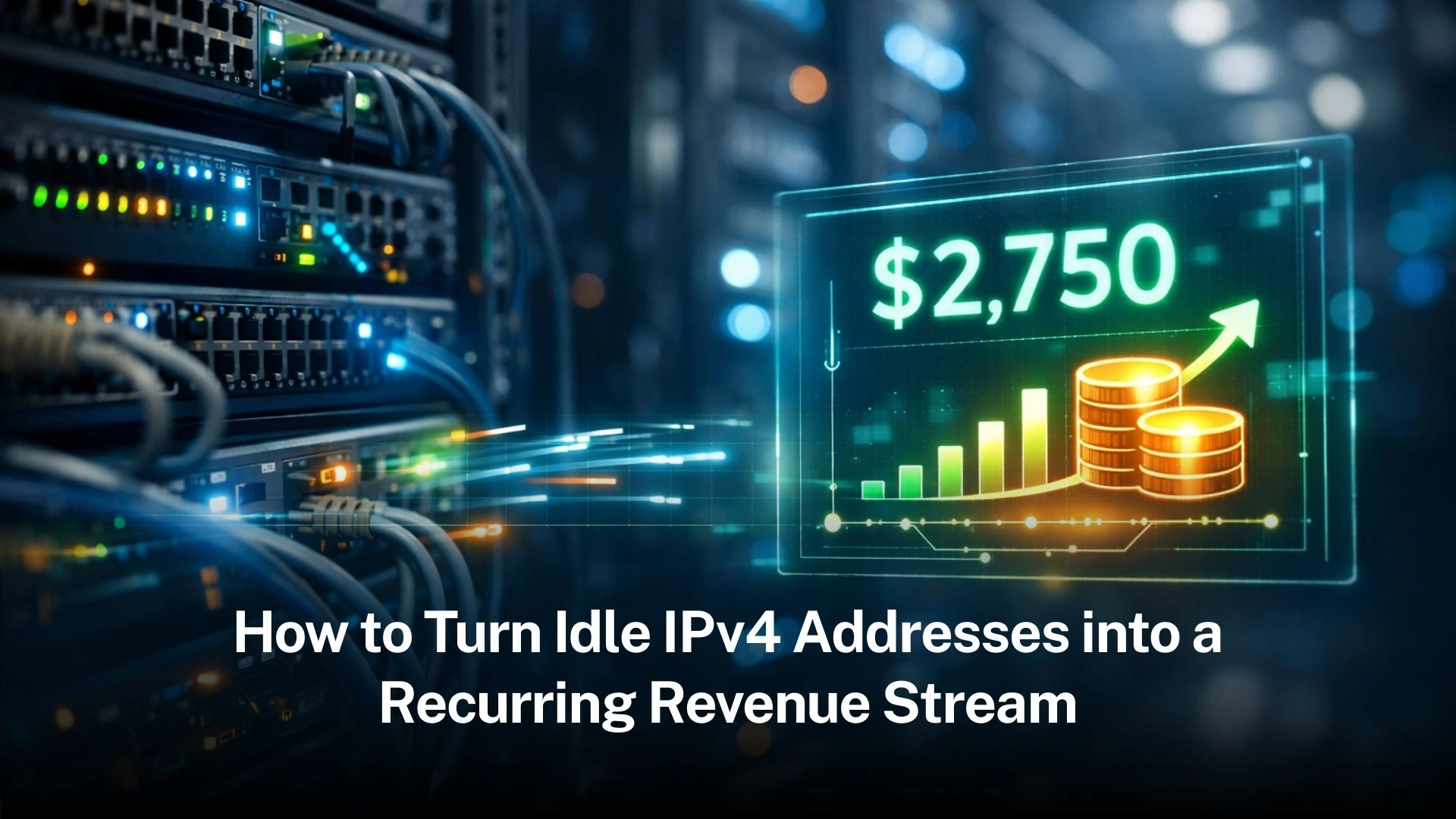BYOIP vs IP leasing: which is better for your business?

Table of Contents
- BYOIP offers greater control and potential cost savings for businesses with existing IP assets.
- IP leasing provides flexibility and lower upfront costs, ideal for businesses with fluctuating needs.
In today’s digital landscape, businesses face critical decisions regarding their IP address management, especially when migrating to cloud services. Two prevalent options are Bring Your Own IP (BYOIP) and IP leasing. Each approach has its advantages and considerations, depending on your organization’s specific needs and resources.
Understanding BYOIP and IP leasing
Also read: How BYOIP Helps Prevent IP Spoofing and Fraud
Also read: Benefits of Using BYOIP for Businesses
What is BYOIP?
BYOIP allows businesses to migrate their existing IP addresses to cloud providers. This approach ensures continuity, maintains established IP reputations, and offers greater control over IP management. Leading cloud providers like AWS, Google Cloud, and Microsoft Azure support BYOIP, enabling seamless integration of your IP addresses into their infrastructure.
The benefits of BYOIP include the ability to retain ownership of your trusted IP addresses, helping you avoid the time and complexity involved in building a new online reputation. It also enhances security by allowing the seamless transfer of existing security policies tied to specific IP addresses into cloud environments. From a compliance standpoint, BYOIP supports adherence to industry-specific regulations and data sovereignty laws, which is crucial for businesses operating in regulated sectors. Additionally, it ensures a smooth and uninterrupted transition to cloud services without the need to change IP addresses. Overall, BYOIP offers greater control over online security and reputation management, giving businesses the ability to operate with consistency and trust across their digital infrastructure. However, implementing BYOIP can involve technical complexities, such as configuring Route Origin Authorizations (ROAs) and updating Registry Data Access Protocol (RDAP) records.
Exploring IP leasing
IP leasing involves renting IP addresses from a provider for a specified period. This approach is particularly beneficial for businesses that require flexibility or have short-term projects.
The advantages of IP leasing include cost-effectiveness, as it requires lower upfront investment compared to purchasing IP addresses outright. This makes it an attractive option for businesses with limited capital or short-term operational needs. Leasing also provides flexibility, allowing organisations to scale IP resources up or down in response to changing demands without the long-term commitment of ownership. Additionally, many leasing platforms offer simplified IP management services, handling the technical and administrative complexities on behalf of the client, which helps reduce the workload on internal IT teams and streamlines overall network operations. However, leasing IP addresses means you do not own them, which can limit control and long-term planning. Additionally, recurring costs can accumulate over time.
Also read: IPv4 Investment – The New Investment Opportunity
Also read: About IPv6 Security Considerations
Cost considerations
BYOIP: While there may be initial costs associated with configuring and integrating your IP addresses into the cloud, BYOIP can lead to long-term savings, especially if you already own IP addresses. For instance, AWS charges $0.005 per hour for each public IPv4 address. By bringing your own IPs, you can avoid these charges.
IP leasing: Leasing IP addresses can be more affordable upfront. For example, leasing a /24 IPv4 block (256 addresses) might cost around $1,636 annually, compared to purchasing the same block for approximately $10,000. However, over several years, leasing costs can surpass the one-time purchase price.
Operational control and flexibility
BYOIP offers greater control over your IP addresses, allowing you to manage configurations, security policies, and compliance requirements directly. This control is crucial for businesses with specific regulatory obligations or those that require consistent IP reputations.
IP leasing, on the other hand, provides flexibility, making it easier to adapt to changing business needs. It’s ideal for startups or projects with uncertain durations, where long-term IP ownership isn’t necessary.
Security and compliance
BYOIP: Retaining your IP addresses ensures continuity in security policies and compliance measures. It simplifies audits and helps maintain trust with clients and partners.
IP leasing: While leasing can meet security and compliance needs, it may require additional steps to align leased IPs with your existing policies. Ensuring the leased IPs have a clean history is also essential to avoid reputational risks.
Making the right choice for your business
When deciding between BYOIP and IP leasing, several factors should be considered. If your organisation already owns IP addresses, BYOIP can be a more cost-effective solution while also offering greater control over IP management. For businesses facing budget constraints or working on short-term projects, leasing may be the more practical choice due to its lower upfront costs. In sectors with strict regulatory requirements, BYOIP is often preferred as it allows for better control and compliance with data governance standards. Meanwhile, companies that require the ability to quickly scale their IP resources may find leasing advantageous, as it provides the flexibility needed to adapt to changing operational demands.
Trusted IPv4 Leasing for Business Growth
Get enterprise-grade IPv4 space quickly, with seamless deployment and end-to-end management.
Get Started with i.leaseFAQs
What is the minimum IP block size for BYOIP on AWS?
AWS requires a minimum of a /24 IPv4 block (256 addresses) for BYOIP.
Can I lease IP addresses and use them with BYOIP?
Yes, some providers allow you to lease IP addresses and integrate them into your cloud infrastructure using BYOIP.
Are there any additional fees associated with BYOIP?
While BYOIP can help avoid certain charges, there may be costs related to configuring and maintaining your IP addresses within the cloud environment.
How does IP leasing impact my IP reputation?
Leased IP addresses may have a history that could affect their reputation. It’s essential to verify the cleanliness of leased IPs to avoid deliverability or trust issues.
Is BYOIP supported by all cloud providers?
Most major cloud providers, including AWS, Google Cloud, and Microsoft Azure, support BYOIP. However, specific requirements and processes may vary.
Related Blogs
Related Posts

Common Myths About Selling IP Addresses
The IPv4 secondary market is often shrouded in mystery, leading many organizations to sit on valuable digital assets because they fear the perceived complexity or legal “gray areas.” As IPv4 exhaustion becomes a permanent reality, the value of these addresses has skyrocketed, yet misconceptions continue to stall potential transactions. At i.lease, powered by the real-world expertise of LARUS, we’ve seen how these myths prevent companies from unlocking significant capital.Read more Related Posts Common Myths About Selling IP Addresses The IPv4 secondary market is often shrouded in mystery, leading many organizations to sit on valuable digital assets because they Read more How to buy IPv4 addresses through a certified IP broker Buying IPv4 space requires policy compliance, verified need, and registry approval, making certified IP brokers essential guides through complex global Read more What happens when IP resources are mismanaged Poor IP resource management can lead to outages, security breaches, blacklisting, legal exposure and reputational damage across networks and business Read more .related-post {} .related-post .post-list { text-align: left; } .related-post .post-list .item { margin: 5px; padding: 10px; } .related-post .headline { font-size: 18px !important; color: #999999 !important; } .related-post .post-list .item .post_thumb { max-height: 220px; margin: 10px 0px; padding: 0px; display: block; } .related-post .post-list .item .post_title { font-size: 16px; color: #3f3f3f; margin: 10px 0px; padding: 0px; display: block; text-decoration: none; } .related-post .post-list .item .post_excerpt { font-size: 13px; color: #3f3f3f; margin: 10px 0px; padding: 0px; display: block; text-decoration: none; } @media only screen and (min-width: 1024px) { .related-post .post-list .item { width: 30%; } } @media only screen and (min-width: 768px) and (max-width: 1023px) { .related-post .post-list .item { width: 90%; } } @media only screen and (min-width: 0px) and (max-width: 767px) { .related-post .post-list .item { width: 90%; } }

How to buy IPv4 addresses through a certified IP broker
Buying IPv4 space requires policy compliance, verified need, and registry approval, making certified IP brokers essential guides through complex global transfers. IPv4 transactions are regulated transfers, not simple purchases — registries must approve documentation, justification and registration changes. Certified brokers reduce risk and delay by aligning buyers with registry policy, routing legitimacy and cross-region requirements. Why companies still need to buy IPv4 addresses The global supply of IPv4 addressesRead more Related Posts Common Myths About Selling IP Addresses The IPv4 secondary market is often shrouded in mystery, leading many organizations to sit on valuable digital assets because they Read more How to buy IPv4 addresses through a certified IP broker Buying IPv4 space requires policy compliance, verified need, and registry approval, making certified IP brokers essential guides through complex global Read more What happens when IP resources are mismanaged Poor IP resource management can lead to outages, security breaches, blacklisting, legal exposure and reputational damage across networks and business Read more .related-post {} .related-post .post-list { text-align: left; } .related-post .post-list .item { margin: 5px; padding: 10px; } .related-post .headline { font-size: 18px !important; color: #999999 !important; } .related-post .post-list .item .post_thumb { max-height: 220px; margin: 10px 0px; padding: 0px; display: block; } .related-post .post-list .item .post_title { font-size: 16px; color: #3f3f3f; margin: 10px 0px; padding: 0px; display: block; text-decoration: none; } .related-post .post-list .item .post_excerpt { font-size: 13px; color: #3f3f3f; margin: 10px 0px; padding: 0px; display: block; text-decoration: none; } @media only screen and (min-width: 1024px) { .related-post .post-list .item { width: 30%; } } @media only screen and (min-width: 768px) and (max-width: 1023px) { .related-post .post-list .item { width: 90%; } } @media only screen and (min-width: 0px) and (max-width: 767px) { .related-post .post-list .item { width: 90%; } }

How to turn idle IPv4 addresses into a recurring revenue stream with iLease
Unlock the hidden value of unused IPv4 addresses with iLease, turning dormant digital infrastructure into a recurring revenue stream while navigating market demand, compliance and risk. Leasing idle IPv4 blocks can generate steady, long-term income without relinquishing ownership. Platforms like i.lease global IPv4 marketplace make it easier to monetise addresses and manage reputation and compliance. why IPv4 addresses still matter Despite the long-anticipated exhaustion of the IPv4 address space — aRead more Related Posts Common Myths About Selling IP Addresses The IPv4 secondary market is often shrouded in mystery, leading many organizations to sit on valuable digital assets because they Read more How to buy IPv4 addresses through a certified IP broker Buying IPv4 space requires policy compliance, verified need, and registry approval, making certified IP brokers essential guides through complex global Read more What happens when IP resources are mismanaged Poor IP resource management can lead to outages, security breaches, blacklisting, legal exposure and reputational damage across networks and business Read more .related-post {} .related-post .post-list { text-align: left; } .related-post .post-list .item { margin: 5px; padding: 10px; } .related-post .headline { font-size: 18px !important; color: #999999 !important; } .related-post .post-list .item .post_thumb { max-height: 220px; margin: 10px 0px; padding: 0px; display: block; } .related-post .post-list .item .post_title { font-size: 16px; color: #3f3f3f; margin: 10px 0px; padding: 0px; display: block; text-decoration: none; } .related-post .post-list .item .post_excerpt { font-size: 13px; color: #3f3f3f; margin: 10px 0px; padding: 0px; display: block; text-decoration: none; } @media only screen and (min-width: 1024px) { .related-post .post-list .item { width: 30%; } } @media only screen and (min-width: 768px) and (max-width: 1023px) { .related-post .post-list .item { width: 90%; } } @media only screen and (min-width: 0px) and (max-width: 767px) { .related-post .post-list .item { width: 90%; } }